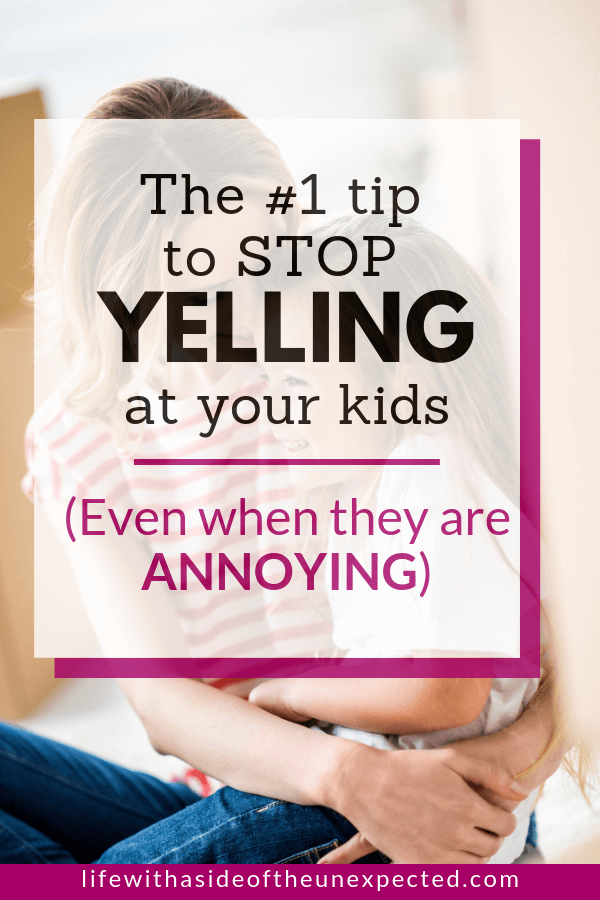We all have times as parents when our kids are driving us crazy and we find ourselves losing our temper with our children.
So, how do we stay calm as a parent and stop yelling at our kids?
Well, let’s first acknowledge the fact that parenting anger is natural.
If you have never found yourself frustrated as a parent, then I submit that you may be superhuman and you probably do not need to read an article about how to quit yelling at your kids.
For the rest of us, our kids have probably made us angry at some point (many points) in our parenting journey.
We may have responded in a less than calm or patient manner and we may be feeling guilty for yelling at our child.
Perhaps we know deep down inside that our child cannot even control their annoying behavior.
There may be other issues at play, such as unmet sensory needs, ADHD, or repetitive behaviors associated with autism.
Nonetheless, on occasion we have reached the end of our rope and lost our patience (and our temper) with our child.

How can we be more patient with our kids when they are pushing all of our buttons?
The first way to be more patient with our child is to remember that they are a… child.
Some annoying kid behavior is actually age appropriate.
When our toddler clings to our legs and whines for our undivided attention, sure it can frustrate us to no end.
But, it is a necessary developmental milestone for kids to constantly want and need reassurance from and connection with their parents.
Tweens and teens can certainly drive parents to a level of frustration and make us so angry that we lose our tempers.
But, certain behaviors of this age group actually mirror that of a toddler.
They simultaneously want their independence but also crave the comfort and security of their parents.
The eye rolls alone can be maddening!
MORE RESOURCES:
How to Control Your Anger as a Parent and Avoid Arguments with Your Middle Schooler
How to Stay Calm while Parenting a Middle School Child
In the grand scheme of parenting, many of the moments that make us the most frustrated and angry are actually pretty typical and developmentally appropriate.
In my own experience, I have to stop getting angry at my children for some of the very same behaviors that I struggle with myself.
It’s frustrating to have a tiny version of yourself reflecting some of your most annoying flaws back at you.
This is when I really have to extend myself (and my children) some grace and realize that we are all imperfect humans.
The surprisingly simple mindset shift to help you stay calm while parenting
While searching for ways to be more patient with my children, I realized that the number one thing to remember is that it is not about me.
My parenting anger, my frustration with my kids’ annoying and challenging behavior, is simply my problem.
As an educator and a mother of a child with autism, I have learned that every behavior is a form of communication.
When you view your child’s annoying behavior through that lens, it’s a bit easier to be more patient.
I am not saying that you will magically become a perfectly calm and patient parent who never loses their temper or yells at their kids.
Let’s not forget that we are all flawed human beings who will get angry with our kids and yell at times.
However, when we pause to think about the function of their behavior, it helps us to reframe our own thinking and look for ways to help meet the needs that are causing that (annoying) behavior.
A surefire strategy to get your kids to listen more (so you can stop yelling at your children!)
As parents get more frustrated and angry with their children’s behavior, their blood pressure rises and the temptation to yell at their kids rises with it.
There are many articles that advise moms and dads to stop, take a breath, walk away or count to 10 in order to control their anger as a parent.
Sometimes these strategies may work to stop from yelling at your kids.
But they do not always effectively teach your children how to listen to you the first time so tempers need not flare in the first place.
What I have found to be highly effective, both with my own children and with children in the classroom, is to whisper.
Yes, you did hear that correctly. When I have the urge to yell, scream and shout as the frustrated adult trying to extinguish annoying kid behavior, I have found it really works to whisper.
You will be amazed how children stop what they are doing just to try to hear what you are saying.
An entire classroom will fall silent within seconds when one student notices that the teacher began to whisper.
Your own children will also take notice if you calmly whisper to them rather than yell.
This only works if you get their attention. It will not be effective if you whisper from across the room and they have no idea that you are even there.

Try this technique some time and you will notice that you feel more calm as a parent, but your children also tend to take notice and hear what you are saying much more than when you yell.
What to do when you slip up and lose your temper with your children?
There will be times that you get frustrated and angry as a parent. You will still more than likely yell at your kids some times.
What can you do when you slip up and are feeling guilty for yelling at your child?
You can start by apologizing.
And not the sort of apology that includes how annoying their behaviors were.
It is actually beneficial for your children to see that you are human and make mistakes, but that you take accountability for them.
When you model how to take responsibility for your actions, and how to have a plan to try to do better next time, you are teaching your kids important character lessons.
Share your plan with your kids for what you will do next time you feel yourself getting angry and like you might yell.
Some times you can even have a “do over” and reframe the entire situation with a different reaction (other than yelling).
This allows children to see a more calm and patient parent rather than an angry and frustrated parent.
Remember – children are always watching us. They model what they see.
So, when we learn how to stop yelling at our kids and how to be a calmer parent instead, our kids pick up on that calm demeanor.
Overall, it may lead to a more peaceful home and family life and less feeling guilty for yelling at our children.
If you found this interesting, or want to remember How to Stop Yelling At Your Kids , please share this post on Pinterest!






2 Comments
Pingback: How to Discipline Your ADHD Child Without Losing Your Temper - Life With a Side of the Unexpected
Pingback: What NOT to Do with an Autistic Child - Life With a Side of the Unexpected